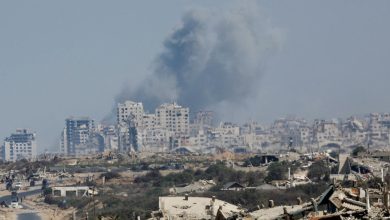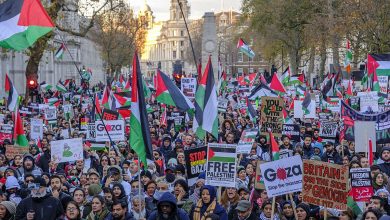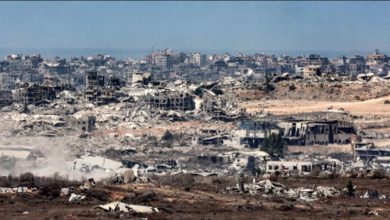
Today, the world marks two years since the outbreak of the devastating war in Gaza, which erupted on the heels of Hamas attack on Israel on October 7, 2023. The war has so far killed more than 67,000 Palestinians, most of them women and children, according to Gaza’s health authorities, causing widespread destruction, displacement and famine.
On the war’s second anniversary, delegations from Hamas and Israel are gathering in Egypt’s Sharm Al-Sheikh, holding high-stakes indirect negotiations to implement the first phase of a US-proposed peace plan, centering on an immediate ceasefire and an exchange of the remaining Israeli hostages in return for Palestinian prisoners.
The Spark of a Regional Crisis
In a surprise attack, Hamas fighters infiltrated into southern Israel on October 7, 2023, killing 1,200 people and taking around 250 others back to Gaza as hostages.
Israel responded by declaring war on the Palestinian movement, bombing Gaza with airstrikes, imposing total blockade on the Strip and launching ground operations to release the hostages and “eradicate Hamas.”
In a bid to achieve these two goals, Israel escalated its military operations to include strikes on Houthis in Yemen, who launched drone and missile strikes against Israel in solidarity with Gaza. Israel also eliminated senior officials of the Lebanese group Hezbollah, including its leader, Hassan Nasrallah.
Moreover, the war has seen unprecedented rounds of escalation between Israel and Iran, culminating in the 12-day war in June 2025.
Eliminating Hamas Leaders
The Israeli Prime Minister, Benjamin Netanyahu, stated two main objectives for the war in Gaza: To return all hostages and to “destroy” Hamas.
Over the past two years, Israel assassinated several key Hamas figures, including deputy leader of Hamas’ political bureau, Saleh Al-Arouri; the military commander of Hamas, Mohammed Deif; Commander of the Hamas Khan Younis Brigade, Rafa Salama; the head of Hamas political bureau, Ismail Haniyeh; Hamas leader, Yahya Sinwar; and the Spokesperson of Al-Qassam Brigades, Abu Obaida.
With regards to the hostages, the Israeli military recovered 8 hostages alive, while Hamas released 140 in return for hundreds of Palestinian prisoners, in addition to the remains of several deceased hostages. According to Israeli government estimates, Hamas still holds 48 hostages, only 20 of them are believed to be alive.
Short-Lived Ceasefire
On January 19, 2025, a ceasefire took effect between Hamas and Israel after the former US President, Joe Biden, announced a three-phase deal mediated by US, Egypt and Qatar. The deal aimed to end the fighting in Gaza, increase humanitarian aid to Palestinian civilians, and return the remaining hostages in exchange for hundreds of Palestinian prisoners.

However, negotiations to implement the second phase stalled and the ceasefire collapsed in March 2025, with Israel imposing a total blockade on humanitarian aid entry into Gaza, before resuming its military operations in the Strip on March 18, to increase pressure on Hamas to release the remaining hostages.
Israel expanded its war efforts, launching Operation Gideon Chariots throughout the north and south of Gaza amid mounting global criticism. In early September, the Israeli military began a ground incursion to occupy Gaza City, the enclave’s largest urban hub, forcing its people to evacuate and head to the south.
Doha Strike
In a major turn of events, the Israeli military launched airstrikes on a residential compound housing a number of Hamas leaders in Doha in September, as they gathered to discuss a US proposal for a ceasefire in Gaza. The attack killed five group officials, including Khalil Al-Hayya’s son and the director of his office, in addition to a Qatari security serviceman.
The attack has sparked regional and global outrage as a flagrant violation of Qatar’s sovereignty and a threat to peace negotiations as Doha is a key mediator in Gaza ceasefire talks, alongside Egypt and the US, ramping up international pressure on the Israeli government.
Genocide and Famine in Gaza
As of October 6, 2025, the war in Gaza killed 67,160 Palestinians and injured 169,679 others. Moreover, the widespread famine claimed the lives of 460 people, including 154 children, according to Gaza’s Health Ministry.
The war has also destroyed or damaged 90% of homes in Gaza, internally displacing 1.9 million of the enclave’s 2.1 million population, the International Organization for Migration reported.

Israel has faced accusations of targeting Palestinian aid seekers near the controversial Gaza Humanitarian Foundation (GHF) amid rising malnutrition and starvation in the Strip. In August 2025, the Integrated Food Security Phase Classification (IPC) determined that Gaza City and the surrounding areas are officially enduring famine that will likely spread across the entire enclave.
Furthermore, an independent investigation, commissioned by UN Human Rights Council (HRC), concluded in September 2025 that Israel has committed genocide in Gaza.
This includes by “killing, causing serious bodily and mental harm, deliberately inflicting conditions of life calculated to bring about the destruction of the Palestinians, and imposing measures intended to prevent births.”
Mounting Pressure on Israel
The devastating war in Gaza and the worsening humanitarian conditions in the Strip have ramped pressure on Israel and increased the country’s international isolation. At the UN General Assembly in September, dozens of diplomatic delegates walked out the room in protest as Netanyahu took to the podium, delivering his speech to an almost empty hall.

Furthermore, the Israeli Prime Minister’s plane had to take an unusual flight route to avoid flying over countries that might try to enforce the arrest warrant issued against him by the International Criminal Court (ICC) last November for alleged war crimes.
Israel is also facing mounting criticism and increasing calls for boycott from traditional allies. Many countries, including Slovenia, Germany, Scotland and Colombia, have halted arms exports to Israel. Other countries, including Colombia, South Africa and Malaysia, have imposed sanctions on Israel, with the European Union also considering economic measures against Tel Aviv.
Several European countries, including Ireland, Spain and the Netherlands, threatened to boycott Eurovision Song Contest 2026 if Israel takes part. Moreover, Hollywood stars and filmmakers have called for boycotting Israeli companies over what they described as “Gaza genocide.” Many international film festivals and fashion shows have turned to platforms for speaking out against Israel’s war on Gaza.

Furthermore, hundreds of thousands of demonstrators took to the streets across Spain, Italy, the Netherlands, Australia, and Germany to protest against Gaza war.
Domestically, the Israeli government faces increasing pressures to end the war and return the remaining hostages. Thousands of Israelis – including military veterans and families of hostages and conscripts – have protested against Netanyahu’s war and the new offensive on Gaza City, which put the hostages lives at risk, calling for an immediate ceasefire that ends the war and brings the hostages back.
Peace Efforts
Since the eruption of the Gaza war, regional and international leaders have made intensive diplomatic efforts to push for a ceasefire to bring the war to an end. This included multiple rounds of negotiations, mediated by Egypt, Qatar and the US.
Saudi Arabia has also led a diplomatic push to advance the two-state solution as the only viable path for achieving peace and resolving the Palestinian-Israeli conflict.
On September 27, 2024, Saudi Arabia announced the launching of the “International Coalition for the Implementation of the Two-State Solution” to end the ongoing war in Gaza and resolve the Palestinian-Israeli conflict, by implementing a two-state solution that establishes an independent Palestinian state.

To this end, the Kingdom, alongside France, hosted the Two-State Solution Conference in July and September 2025, mobilizing support for the establishment of an independent Palestinian State along the 1967 borders, allowing Palestinians and Israelis to live side by side in independent nations.
Palestine Recognition
Saudi Arabia’s efforts to mobilize support for the recognition of Palestine and the two-state solution have gained momentum as the dire humanitarian situation in Gaza pushed several countries, including Israel’s allies, to formally recognize Palestinian Statehood.
In the past two years, Spain, Ireland, France, the UK, Canada, Australia, Luxemburg, Malta and Portugal joined 140 countries worldwide in recognizing the State of Palestine, raising the number of UN member states that recognize Palestinian statehood to 157.
Trump’s Gaza plan
Most recently, the US President, Donald Trump, proposed a 20-point peace plan to end the war. The plan calls for an immediate end to Israeli military operations in Gaza, the release of the remaining hostages within 72 hours, and the demilitarization of Hamas. It also calls for an international transitional body to run the enclave and leaves the door open for an eventual Palestinian State.

Israel and Hamas responded positively to the plan, which got the backing of Arab and Western countries. Trump expressed optimism regarding the first phase of talks, urging negotiators to “move fast.”
After the first session of talks ended on Monday evening in Egypt, Trump expected a deal to be finalized soon. “I really think we’re going to have a deal. We have a really good chance of making a deal, and it’ll be a lasting deal,” he told reporters at the White House, reported Reuters.
However, as talks are due to resume on Tuesday, some sticking issues remain. Trump’s plan involves an international transitional body running Gaza for five years and the exclusion of Hamas from future governance.
Meanwhile, the group said in its response that it agrees to the release of all hostages and handing over the administration of the Strip to an independent Palestinian body, while insisting it should have a say in the enclave’s future. Trump earlier warned that the Palestinian group faces “complete obliteration” if it insists on staying in power in Gaza.







